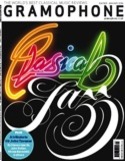Texte paru dans: / Appeared in:
*

GRAMOPHONE (01 /2014)
Pour s'abonner /
Subscription information
Aparté
AP061
3149028040326 (ID361)
Reviewer: Richard Lawrence
Phaéton – normally styled Phaëton – was first performed at the new palace of Versailles in January 1683, transferring to the Opéra in Paris in April. It was the last of Philippe Quinault’s librettos to be drawn from Ovid’s Metamorphoses. The story is about the consequences of presumption. Phaethon ditches Theona, whom he loves, for Libya, whom he doesn’t, in order to inherit the throne from her father Merops, whom his mother Clymene married as his second wife. Libya loves Epaphus, and vice versa; he, the son of Jupiter, taunts Phaethon by doubting that his father was the Sun (by Clymene before she married Merops, OK?). Phaethon is reassured by the Sun, but as proof to the world demands to be allowed to drive his father’s chariot. He takes the reins but loses control; to save the Earth from destruction he is struck down by a thunderbolt from Jupiter, thus fulfilling a prediction by Proteus (who is Theona’s father, by the way).
As Louis XIV was known as the Sun King – the opera begins with the usual sycophantic Prologue about ‘le plus grand des héros’ – it’s tempting to wonder who might be identified with Phaethon. In his booklet-note, Jean Duron makes several suggestions, none of them the Dauphin. But leaving complication and speculation aside, there’s much to enjoy here. As usual with Lully, the most appealing music is to be found in the choruses and dances, including a jolly chaconne. Proteus has a sommeil, one of Lully’s trademark sleep scenes, but it’s very short. Other set pieces include a heartfelt lament for Theona, ‘Il me fuit, l’inconstant!’, and a tender duet for Libya and Epaphus in the last act.
The cast is led by Emiliano Gonzalez Toro, whose light, haute-contre tones admirably convey Phaethon’s ambition, arrogance and essential weakness (he’s rather a mummy’s boy). Andrew FosterWilliams’s virile baritone is equally well suited to Epaphus. Cyril Auvity is outclassed by Jean-Paul Fouchécourt, who takes the same three parts for
Marc Minkowski. The three women
are excellent, as are the chorus and orchestra. Minkowski has a larger continuo
group and adds tuned percussion; there’s a puzzlingly needless cut in Act 2
scene 3. Anybody who owns his fine set can rest content; newcomers might prefer
Rousset’s account, plainer but just as lively.
Cliquez l'un ou l'autre
bouton pour découvrir bien d'autres critiques de CD
Click either button for many other reviews


